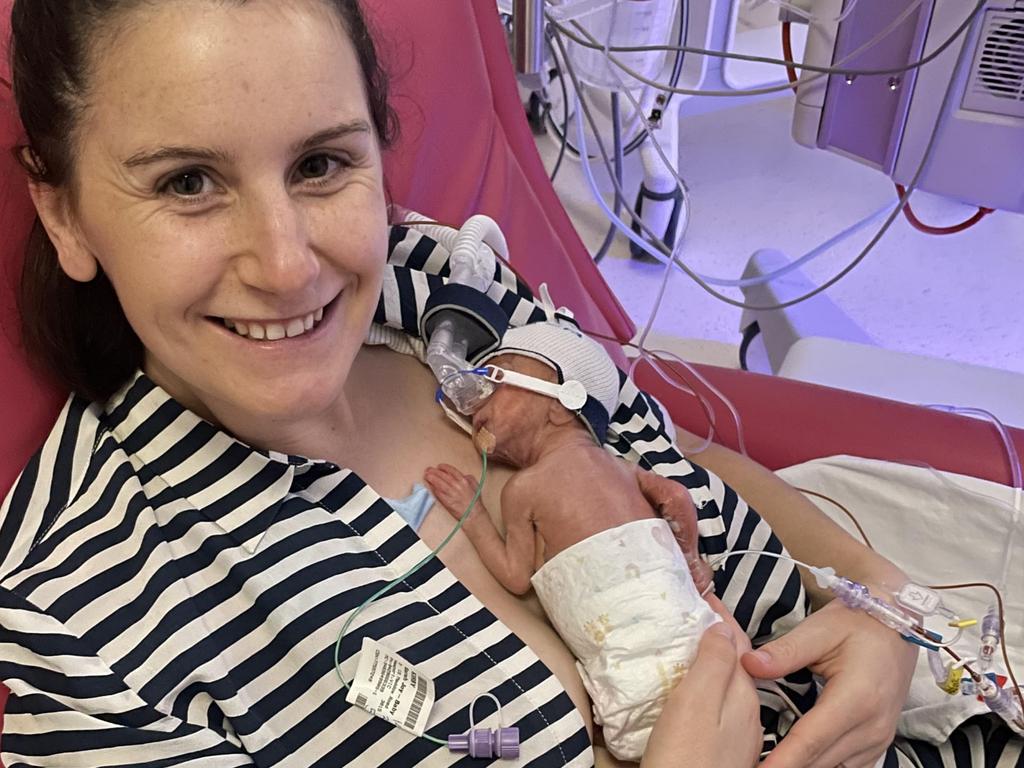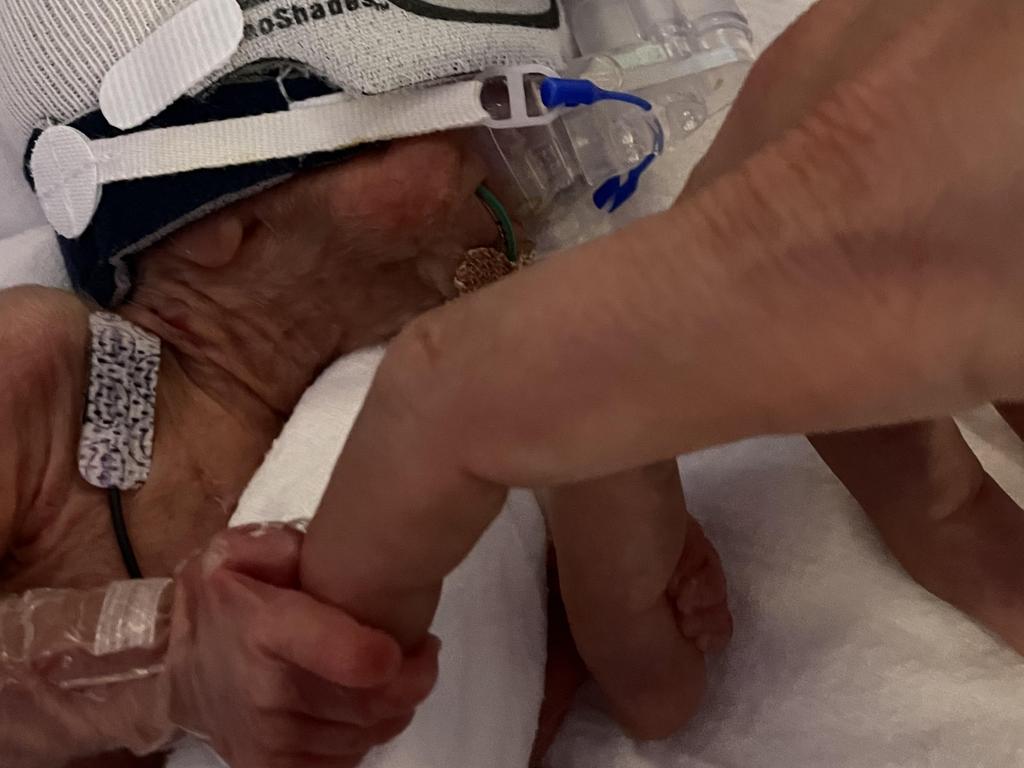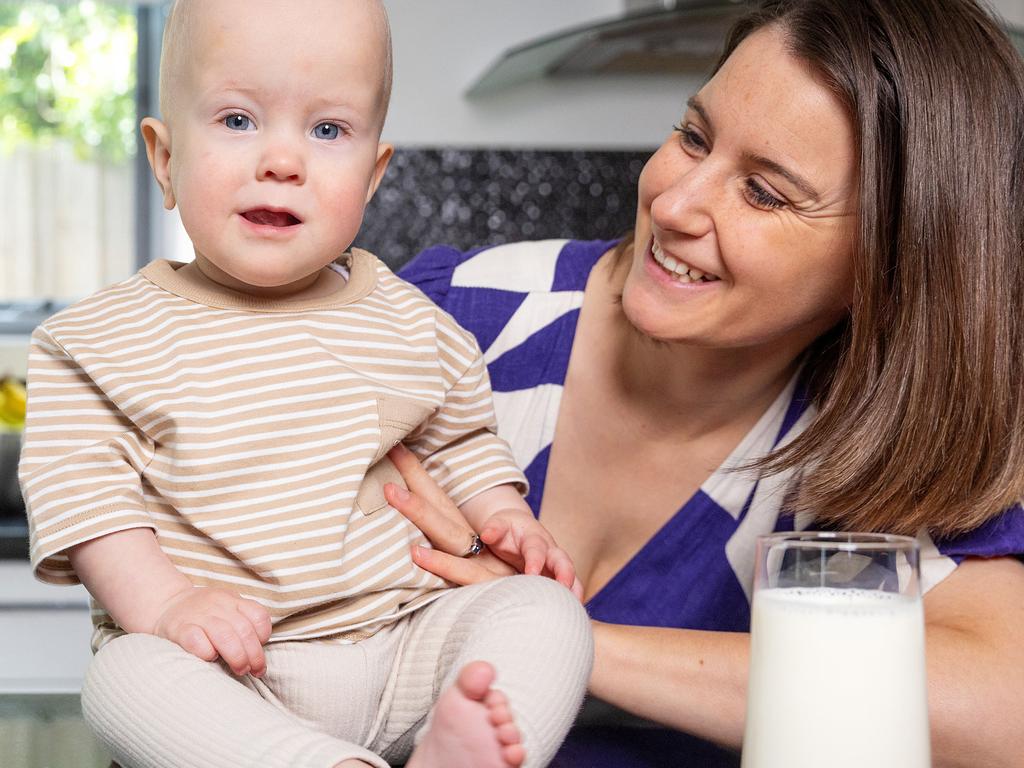MCRI guidelines to care for country’s very prem babies
Delivered at 26 weeks and weighing just 700 grams, Newport bub Teddy is one of thousands of prem babies born in Australia every year. Now new guidelines are set to shape their care.
Victoria
Don't miss out on the headlines from Victoria. Followed categories will be added to My News.
When he made his early and dramatic arrival into the world, tiny Teddy Kirby weighed about the same as a glass of milk.
Newport mum Sarah Kirby said her “miracle boy” was delivered at just 26 weeks by an emergency caesarean after his heart rate started to slow.
He weighed just 719g when born, so tiny that he could almost fit into the palm of her hand.
“His tiny ears were like tissue and his skin transparent. I was taken aback at how thin he was because he hadn’t had a chance to put on any weight,” Ms Kirby said.

Teddy, now 14 months old, is one of around 3500 Aussie babies born early each year.
Experts say around 40 per cent will experience some health setbacks including delayed growth, hearing loss, neurodevelopmental and sleep problems, language delay and autism.
The key, they say, to optimising the health of the babies, their growth and development is to detect any potential challenges early.
To ensure this, a team led by the Murdoch Children’s Research Institute (MCRI) will release on Tuesday Australia’s first clinical guidelines for babies born in Australia before 32 weeks.

To ensure this, a team led by the Murdoch Children’s Research Institute (MCRI) will release on Tuesday Australia’s first clinical guidelines for babies born in Australia before 32 weeks.
The guidelines, says MCRI Professor Jeanie Cheong, will be available online and accessible to any health professionals and families.
“The purpose is to bring together the decades of research, including that from within Australia and our team, to produce evidence-based guidelines to assist healthcare professionals, health services and the families to know best practice.”
Prof Cheong said the National Health and Medical Research Council-funded guidelines were developed after a rigorous two-year consultation.

They will now recommend the follow-up services needed from when babies leave hospital until they turn six years old.
Professor Cheong says while the guidelines end at school entry, the team hopes to get further funding to be able to involve school-age children and adults.
“We have known for a long time that some children born very preterm, less than 32 weeks of a 40-week completed pregnancy, have a higher chance of having challenges in multiple areas of health development and growth,” she said.
“In order to help children reach their full potential, they need to have follow-up but follow-up that is also targeted,” Professor Cheong said.

“Many children born at less than 32 weeks do receive some sort of follow-up, but it can often depend on where you live and on your access to health care.”
MCRI’s Dr Jamie Owen said to avoid these gaps in care, every family with a child born very preterm should be guided by a co-ordinated, multidisciplinary team.
“These guidelines detail how GP clinics, hospitals and other healthcare centres can work together to ensure all children have access to transformative, ongoing care and any health concerns are identified and treated early,” she said.
Teddy is now a healthy, happy toddler learning to walk, determined to run. “He is the light of our lives,” Ms Kirby said. “Teddy is meeting all his milestones, doing everything he should be.”
Ms Kirby says the guidelines will be a valuable resource for parents when their bub can leave hospital. .
“While there has always been information for parents, this is taking it to the next level,” she said.
Teddy was born at The Women’s and spent almost 100 days there before he could be home with his parents and big sister Lola, 9. “We are beyond happy,” Ms Kirby says. “Everything’s perfect.”
To read the guidelines, visit crenewbornmedicine.org.au/our-news/news/2024/guideline-for-growth-health-and-developmental-follow-up-for-children-born-very-preterm/
More Coverage
Originally published as MCRI guidelines to care for country’s very prem babies








